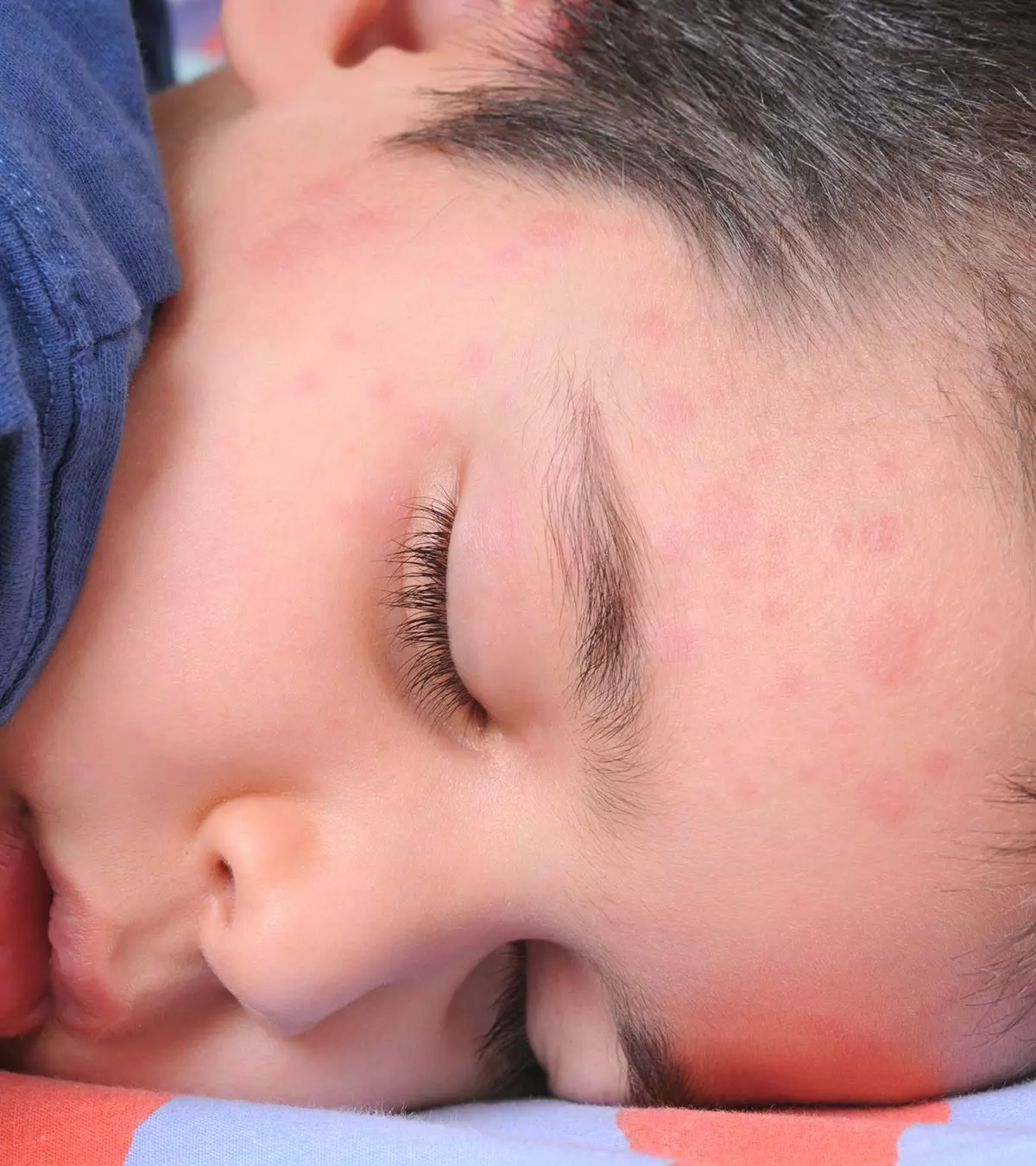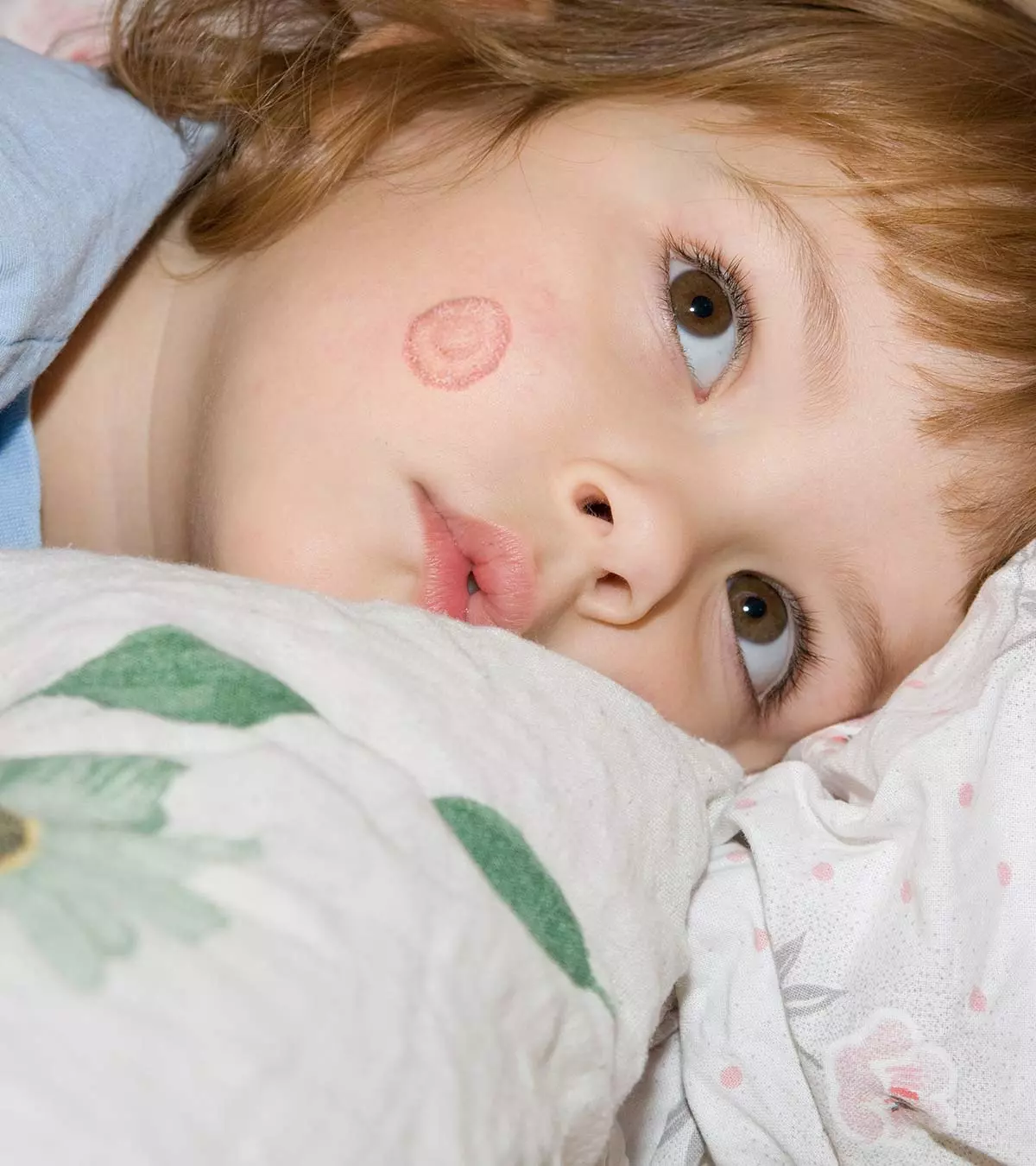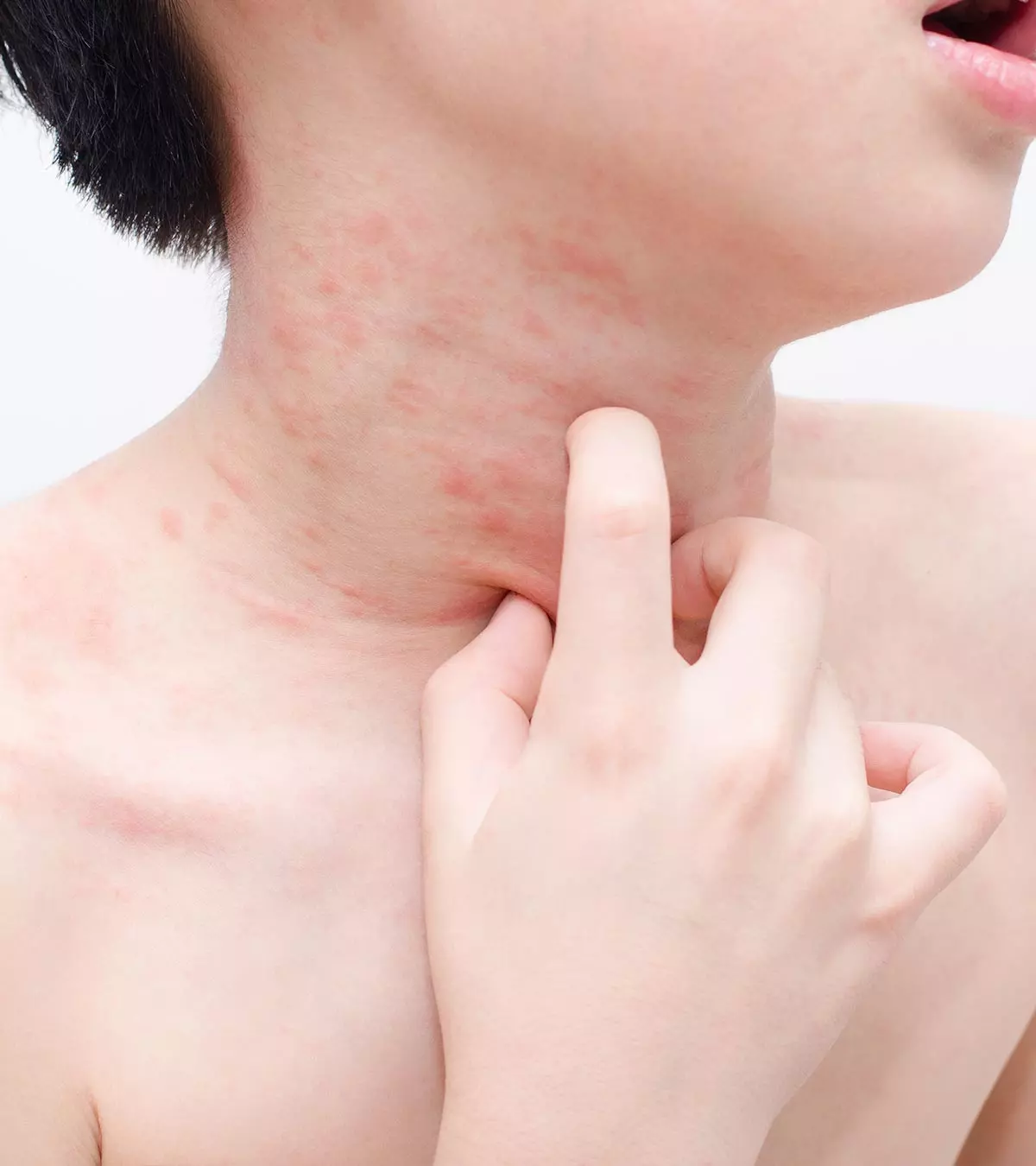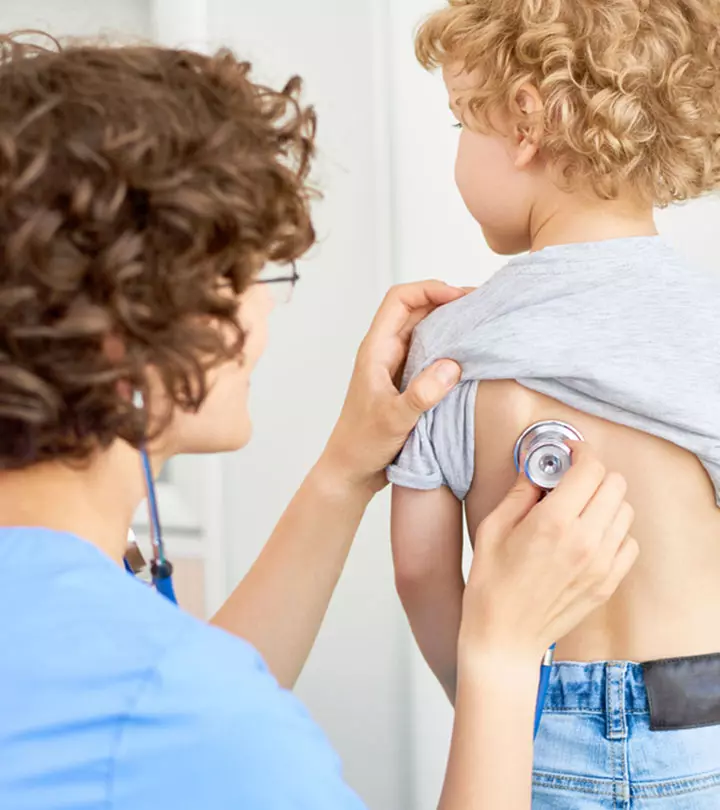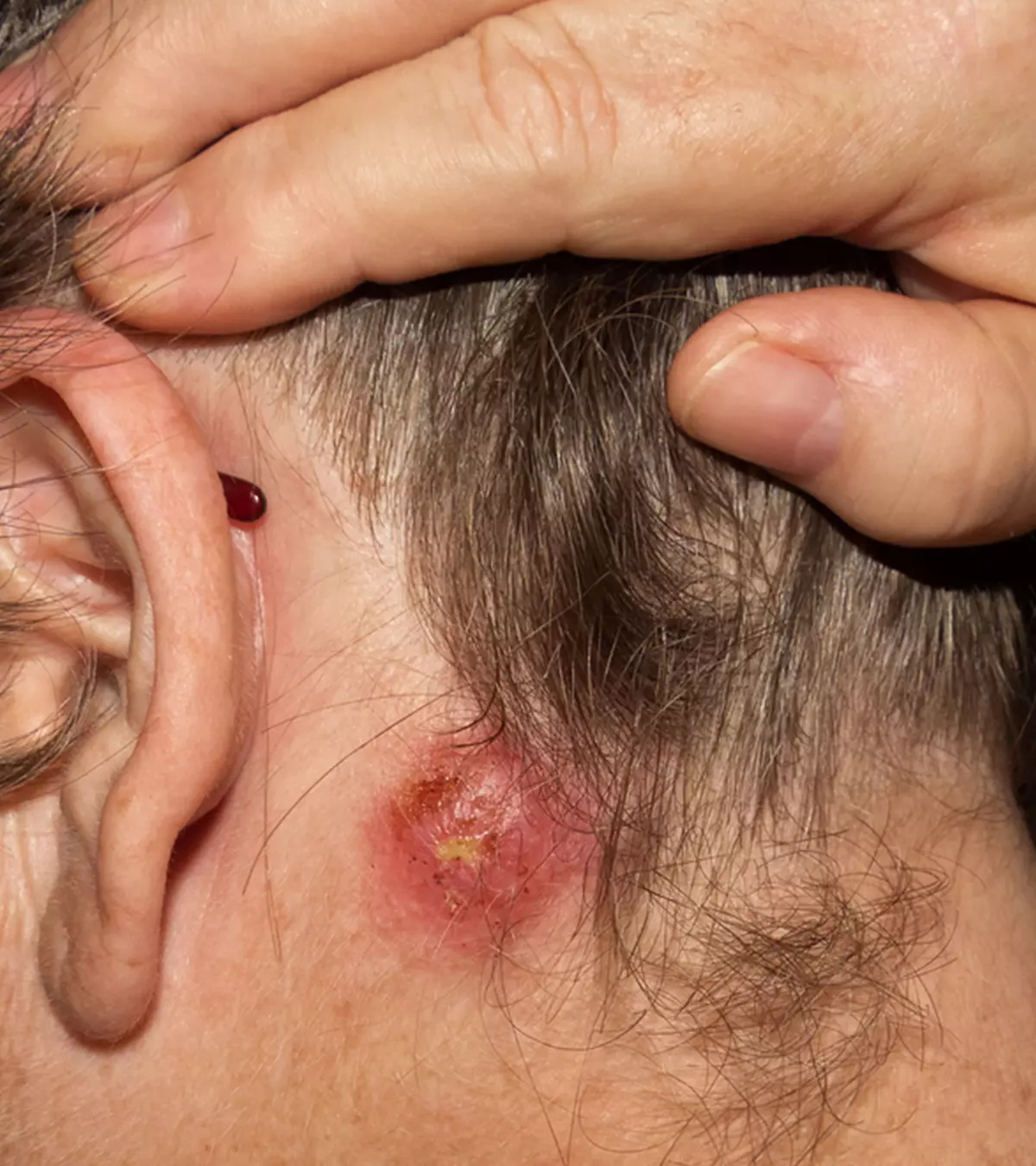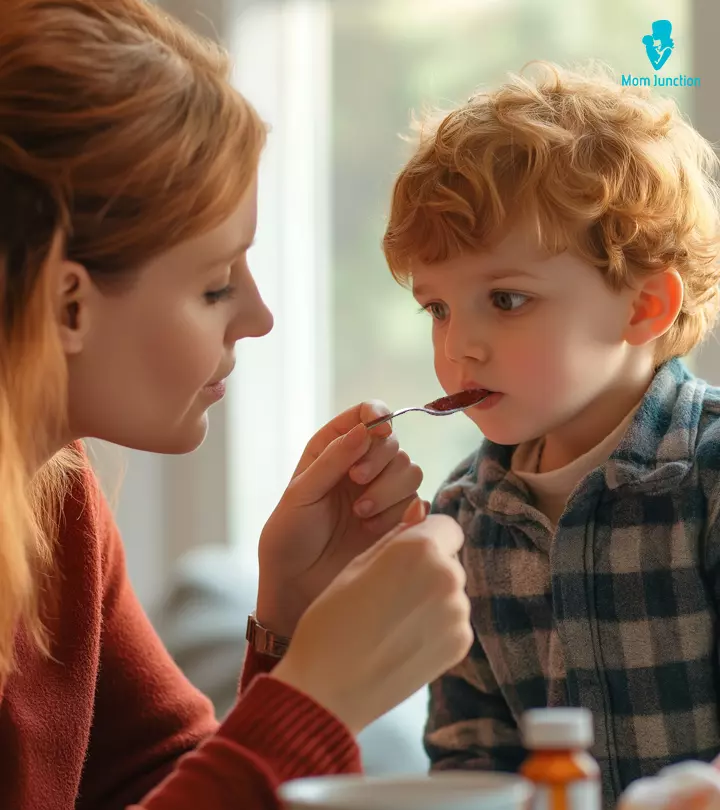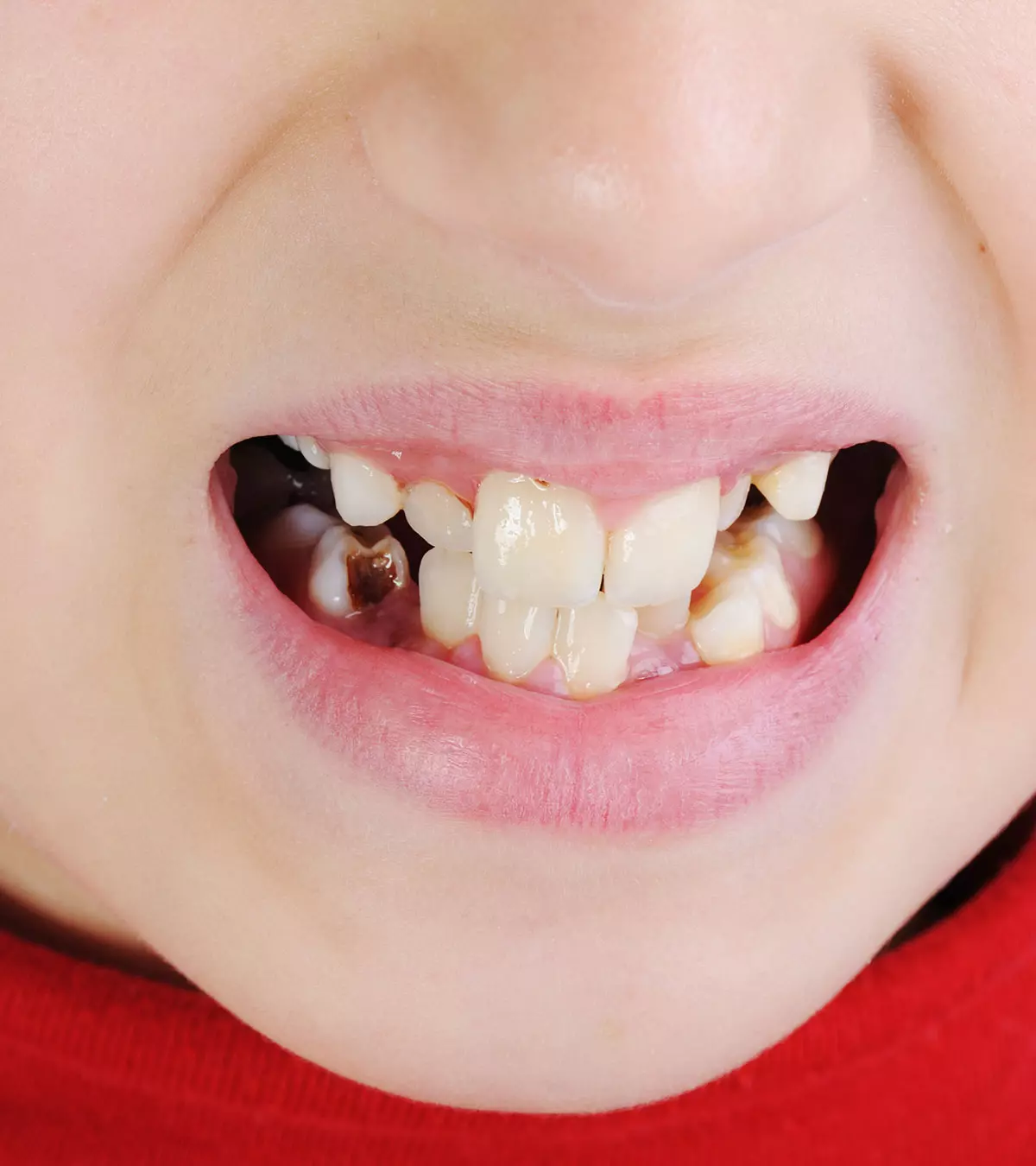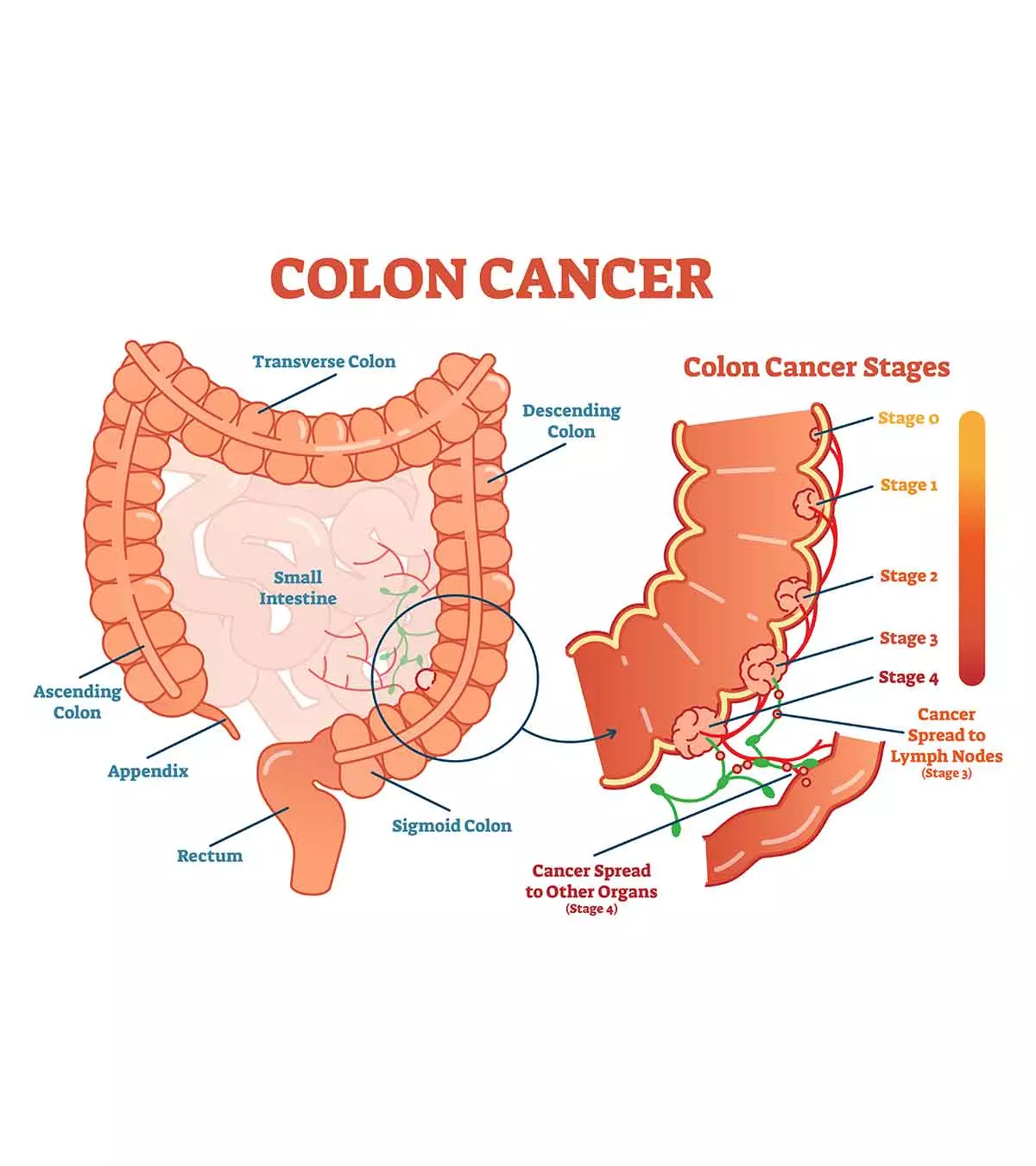
Image: Shutterstock

Colon cancer in teens is rare. It is a malignant neoplasm originating in the colon, a part of the large intestine. It is also called colorectal cancer if colon cancer is present with rectal cancer. Although it is common in adults, this can affect any age. A one in 1000,000 incidence rate includes 2.1% of all malignancies in people below 20 (1). Sometimes the diagnosis can be delayed in teens since regular screening is only recommended for adults. Seeking early medical care if there is a family history or for digestive symptoms may help improve outcomes.
Read on to know the causes, symptoms, tests, treatment, and ways to prevent colon cancer in teens.
Key Pointers
- Colon cancer is rare among teenagers, but early medical attention can help if there is a family history of the disease.
- Symptoms of colon cancer in teens include rapid weight loss, exhaustion, stomach pain, and blood in their stools.
- Genetic changes may be a significant contributing factor to the development of colon cancer, although the precise cause is unknown.
- Diagnosis of colon cancer involves blood tests, imaging, and biopsy.
- Treatment for colon cancer in teens depends on the stage of cancer, location, and the teen’s health level.
Symptoms Of Colon Cancer In Teens
According to the American Cancer Society, colon cancer often has no symptoms in its early stages, and many teens may remain asymptomatic initially. Also, the symptoms may vary based on the size and location of cancer. Symptoms and signs of colon cancer can include (2):
- Unexplained weight loss
- Tiredness
- Persistent abdominal pain, cramps, or gas
- Diarrhea or constipation
- A feeling of incomplete emptying of the bowel
- Blood in stool or dark stool
 Point to consider
Point to considerThe presenting symptoms and signs are similar to the more common conditions found in childhood but, because of its rarity, often leads to a delayed diagnosis and hence presents at an advanced and incurable stage. The onset of irregular bowel movements or changes in bowel habits like constipation, diarrhea, or stool narrowing are common symptoms of colon cancer. Nausea, unexplained appetite loss, unexplained weakness or fatigue, and abdominal mass or lump in the abdomen are some more symptoms likely to be seen by teens in case of colon cancer.
Although blood in a child???s stool can be a common symptom of bowel cancer, rectal bleeding may also occur in hemorrhoids (piles), anal fissures (tear in the mucosal lining of the anus), etc. Seek medical care if your teen has changed bowel habits or blood in the feces.
When To See A Doctor
If your teen has any persistent symptoms, like unexplained weight loss, blood in their stool, constant stomach pain, or changes in bowel habits, it is important to consult a doctor. You may also initiate a medical visit for early screening if you have a family history of inherited syndromes, such as Lynch syndromeiA hereditary genetic mutation that increases the risk for various types of cancer. or colorectal cancers.
Your doctor may help you identify risk factors and arrange a screening. The doctor may refer your teen to cancer experts for detailed diagnosis and treatment if required.
What Are The Causes Of Colon Cancer In Teens?
Most patients do not have a relevant past medical or family history, suggesting that it arise as a result of spontaneous genetic mutation.
The exact cause of colon cancer is unknown. Genetic changes can be a significant cause in several cases. The mutation (changes) in the cells’ DNA can make them cancerous. It can cause the cell to undergo uncontrolled and unregulated division, thus causing an accumulation of cells that form colorectal tumors (3). Further, genetic predispositions, including inherited conditions such as Lynch syndrome and familial adenomatous polyposis, play a significant role in the development of colon cancer in younger individuals (18). Awareness of these conditions is vital for early diagnosis and preventive measures.
The cancer cells continue to multiply and invade the healthy tissues surrounding it. The cells may also metastasize (move) from the site of origin to other parts of the body via blood or lymph.
Early diagnosis based on suspicion can be influential in determining the outcome.
A population-based study on cancer incidence in adolescents and young adults (AYAs) showed that cancer incidence increased in all AYA age groups during the most recent decade. The graph below also shows that thyroid and lymphoma are the most commonly diagnosed cancers in adolescents. In contrast, the incidence of adolescent colon and rectal cancer and melanoma (skin cancer) cases are comparatively low.

Leading cancer types in teens by age
Source: Cancer statistics for adolescents and young adults, 2025; American Cancer Society Research finds
Research findsRisks Factors Of Colon Cancer
The following factors may increase the risk for colon cancer (4).
- There is an increased risk of colon cancer if a person has a family history of colorectal cancer due to genetic mutations present in families. The risk can be high if more than one family member has the disease. According to the US National Cancer Institute, colorectal cancer is generally rare and is seen in 0.5 cases per 100,000 individuals younger than 20 years in the US annually.
- A few cases of colon cancers are linked to inherited syndromes such as Lynch syndrome and familial adenomatous polyposisiCondition where there are a large number of polyps (adenomas) in the large intestine. (FAP), Gardener's syndromeiA subtype of familial adenomatous polyposis characterized by multiple colorectal polyps and tumors. , juvenile polyposisiHereditary condition where benign tumors are found in the gastrointestinal tract. , Turcot's syndromeiHereditary condition characterized by polyps on the inside walls of the colon and rectum, and brain tumors. . These are hereditary nonpolyposis colorectal cancers (HNPCC) that are passed through generations in the family. There is a significant risk for colon cancer if your family has the inheritance of these syndromes
- History of polyps or colorectal cancer and the presence of benign adenomatous polypsiGrowths in the mucous membrane that lines the large intestine. in the colon can increase the risk for colon cancer. Colorectal carcinoma may also reoccur in some people
- Teens with chronic inflammatory bowel disease, such as ulcerative colitisiA chronic condition leading to inflammation and sores in the large intestine due to an abnormal immune response. or Crohn's diseaseiA chronic inflammatory and autoimmune condition of the digestive system characterized by pain, diarrhea, and fatigue.
- Inactive or sedentary lifestyle may be linked to colon cancer. This also increases the risk for obesity and diabetes, which are also risk factors for colon cancer
- Low fiber diet with high consumption of calories and fats. Some studies have linked consumption of high amounts of processed food and red meat to colon cancer
- Insulin resistance or type II diabetes mellitus
- Obesity
- Smoking
- Heavy consumption of alcohol
- There is an increased risk of colon cancer among teens who underwent radiation therapy directed at the abdomen for other childhood cancers
Colorectal cancers are few in young people. The young-onset of bowel cancer can be due to hereditary factors and genetic alterations than other risk factors.
 Research finds
Research findsDiagnosing Colon Cancer In Teenagers
The doctor may order a few tests and procedures to confirm or exclude the cancer diagnosis. The tests may include the following (5).
- Colonoscopy and biopsy: It consists of the visualization of the colon with a device and the collection of samples from suspected areas. These samples are sent to the laboratory for analysis.
- Blood tests: It is often performed to assess the general health and the functions of the liver and kidneys. A blood test can often be useful to analyze the presence and level of carcinoembryonic antigeniProteins produced by certain types of cancer. (CEA) that is sometimes seen in colon cancer. The level of CEA can help decide treatment and prognosis.
After the confirmation of the colon cancer, your doctor may also order imaging tests such as CT scan, MRI scan, or PET scan to determine the extent (stage) of the colon cancer.
 Quick fact
Quick factPelvic, abdominal, and chest imaging is usually done to identify the spread and metastasis before the staging of cancer. However, the doctor may order other tests based on coexisting signs and symptoms, if any.
Stages Of Colon Cancer
The following are the stages of colon cancer (6).
- Stage 0: Abnormal cells are present in the wall or mucosa of the colon, also called carcinoma in situ.
- Stage I: Cancer is limited to the mucosal and submucosal lining of the colon.
- Stage II: Cancer spreads beyond the colon wall without lymph node involvement. This is sub-classed into three stages based on the invasion of nearby tissue and organs.
- Stage III: Cancer spreads beyond the colon wall and lymph nodes are affected.
- Stage IV: Presence of metastasis in other organs or tissues of the body.
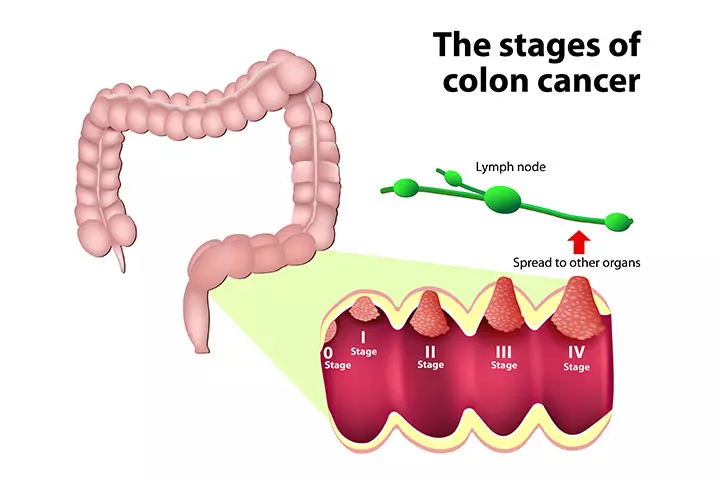
These stages are important to determine the treatment and prognosis of colon cancer. In a few cases, the exact stage of cancer is identified at the time of cancer surgery.
Colon Cancer Treatment In Teenagers
Colorectal carcinoma treatment is based on the stage and location of cancer, along with the health status of the teen. Treatment for early stages of colon cancer can be minimally invasive surgeries, including the following (7).
- Polypectomy: This is the removal of colorectal polyps during a colonoscopy. It is done for cancers that are small and contained in a polyp.
- Endoscopic mucosal resection: It is the removal of cancerous polyps and lining of the colon during colonoscopy with special tools.
- Laparoscopic surgery: Minimally invasive laparoscopic surgeries are performed to remove colon polyps that cannot be removed during a colonoscopy. These surgeries are performed by inserting special instruments with a camera through a small incision.
Surgeries for more advanced colon cancer may include (7):
- Partial colectomy (bowel resection): This is the removal of a part of the colon where the cancer is located, along with tissues around it. Colon cancer can be located in any part of the colon, such as sigmoid colon, transverse colon, ascending colon, or descending colon. The affected area is removed and reconnected with the healthy part after the removal of cancer.
- Hemicolectomy: This is the removal of the left or right segment of the colon in advanced colon cancers.
- Colostomy: This is the surgical procedure to create an opening in the abdominal wall where the content (feces) from the colon can be drained into a bag. The colostomy is often done temporarily, and after healing, the colon will be connected to the rectum.
- Removal of lymph nodes: Nearby lymph nodes are removed to prevent the spread of cancer.
If the colon cancer is in a later stage with metastasis, then surgeons may recommend surgeries to relieve the blockage of colon and other symptoms, such as bleeding or pain. However, if the health status is good, then the removal of metastatic tumors is done with adjuvant chemotherapyiUse of chemo, hormonal, antibody, or radiation therapy in addition to surgery in cancer treatment. to improve survival.
Other treatments
Treatments other than surgery for colon cancer include the following.
- Chemotherapy: It is the treatment of cancer using drugs that can kill cancer cells. Chemotherapy includes drugs like 5-chlorouracil, leucovorin, and cisplatin can be given before surgery to reduce tumor growth, thus making the surgery less complicated. Post-surgical chemotherapy is given to larger cancers with lymph node involvement. It can destroy cancer cells and prevent spread (metastasis) of cancer to other tissues and organs. It may also be done to relieve symptoms (8).

- Radiation therapy: This uses energy sources such as X-rays and protons to destroy cancer cells. It can be done before surgery to shrink large cancer or to relieve symptoms if surgery cannot be done (9).
- Targeted drug therapy: This is treatment using specific drugs to block growth and metastasis of cancer. These drugs can target growth factors, proteins, or genes of cancer cells. It may often be combined with chemotherapy (10).
- Immunotherapy (biologic therapy): This treatment uses drugs that boost the body’s immune system to fight cancer (11).
Chemotherapy and radiotherapy can be used alone or along with surgery to improve outcomes or relieve symptoms in end stages of colorectal cancer. Supportive care or palliative care is given to relieve pain and other symptoms. This helps improve the quality of life. It can be given alone or with other treatments.
Complications Of Colon Cancer In Teens
Acute complications of colon cancer can include (12):
- Bleeding: This may lead to anemia and peripheral circulatory failureiInadequate circulation of blood and oxygen in the body. due to blood loss. Severe rectal bleeding can result in kidney dysfunction and may present with azotemia, which is an increased amount of nitrogen in the blood. Bleeding may also cause persistent fever for days or weeks due to the dysfunction of thermoregulatory functions of the body.
- Obstruction: Colon cancer can often grow into the lumeniInside of a tubular structure such as the artery or intestine. of the colon and obstruct bowel movement. This may cause decreased absorption of fluid and nutrients and increased secretion of fluids to relieve obstruction, thus eventually resulting in dehydration. Obstruction may also cause dehydration and electrolyte loss due to vomiting and toxemia (blood poisoning) due to increased bacterial growth. Vomiting, distended abdomen, and dehydration can be signs of bowel obstruction. This requires immediate medical care.
- Perforation: Rarely, colon cancer causes perforation of the bowel wall. This may often occur due to obstruction. Bowel perforation requires emergency surgery.
 Experts say
Experts sayIf you notice any concerning signs and symptoms in your teen, then make an appointment with the doctor for early diagnosis and treatment. It may help to avoid complications.
Preventing Teenage Colon Cancer
The best way to prevent colon cancer and its complications is screening at an early age if the risk factors are present. For teens at higher risk, such as those with a family history of colorectal cancer or genetic syndromes, screening may begin in early adolescence or as recommended by a healthcare provider. Colon cancer begins as polyps (flat bumps) inside the colon. Regular screening can help to diagnose colorectal polyps and prevent them from turning cancerous.
Screening for colon cancer is usually recommended around 50 years of age. However, early screening is done for high-risk groups such as those who have a positive family history.
The following lifestyle changes may help to reduce the risk factors (4).
- Maintain a healthy diet: Certain diet modifications, such as including a fiber-rich diet composed of fruits, grains, vegetables, and other micronutrients, could help prevent colon cancer and other bowel-related issues. In addition, avoiding sugary and carbonated drinks while maintaining stable hydration levels is essential.
 Experts say
Experts say- Physical activity: Regular exercise can be a protective factor for many diseases, including colon cancer. Ensure your teen stays physically active to maintain a healthy weight and reduce cancer risk.

- Avoid smoking and excess alcohol: Teenage smoking and alcoholism could result in many health issues, including colon cancer. In addition, avoiding tobacco and limiting exposure to environmental toxins can help lower the risk of colon cancer in teens.
According to the US National Cancer Institute, increasing protective factors and avoiding risk factors may help prevent colorectal carcinoma (4). You may seek medical care for screening and preventive treatments if you have a family history of colon cancers.
Infographic: Parenting Tips For A Child With Cancer
Cancer of any type, such as colon cancer, in teens is rare. Therefore, the diagnosis can be devastating for the parents. Besides medical treatment, cancer requires utmost emotional support for comprehensive healing. Here is an infographic that provides you with some tips on how you may help children who battle cancer. Illustration: Momjunction Design Team
Frequently Asked Questions
1. Can a 15-year-old have colon cancer?
Yes, colorectal (or colon) cancer can develop in 15-year-olds, but such cases of pediatric colorectal (or colon) cancer are extremely rare (13).
2. How long can your teen live with untreated colon cancer?
The survival rate of teens and young adults with colon cancer, particularly in stage IV, is relatively low, and if left untreated, it can further lead to a poorer prognosis (14).
3. Are there any long-term effects of colon cancer treatment on teenagers?
The long-term effects of colon cancer treatment on teenagers may vary depending on the treatments used. Long-term consequences may include fertility issues, problems with other organs, increased risk of developing other cancers in life, pain and swelling in other body parts, hormone deficiencies, and the requirement for continued surveillance for recurrence or related conditions (17).
Colon cancer in teens is not very common, though it is treatable when identified in its early stages. However, you may contact counselors, connect with your friends and family or seek support from dedicated organizations to cope with your worries and seek emotional support. Although colon cancer is known to have a poor prognosis rate, there is a fair chance of recovery in individuals in the early stages and by screening high-risk persons with a family history of cancers. Nevertheless, following a healthy diet and lifestyle could diminish the risk of teenage colon cancer.
Illustration: Symptoms And 11 Risk Factors Of Colon Cancer In Teens
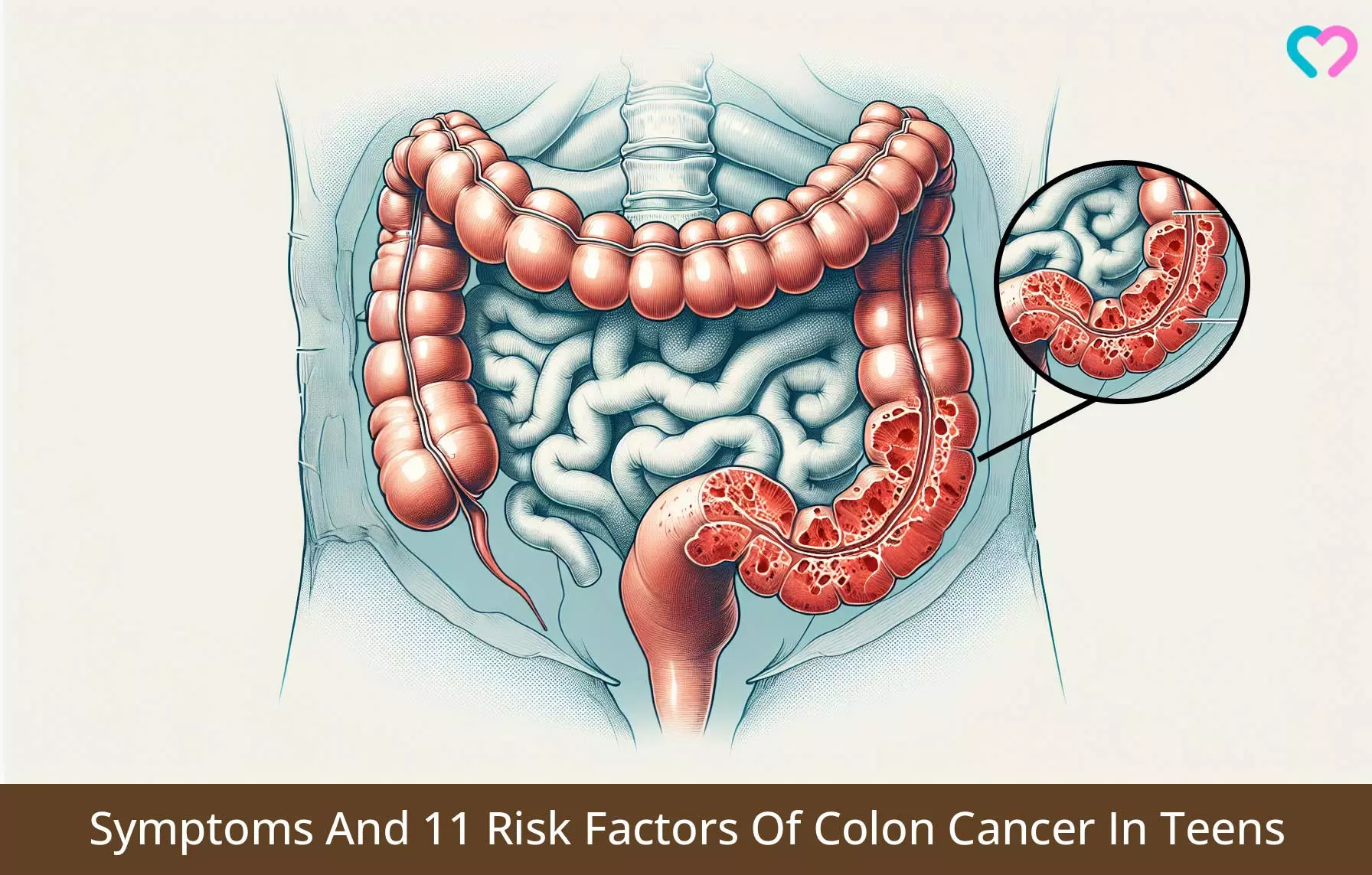
Image: Dalle.E/MomJunction Design Team
Stay vigilant to the warning signs of colon cancer, which can have life-threatening implications. Educate yourself on the ten prevalent symptoms for timely detection and intervention.
References
Community Experiences
Join the conversation and become a part of our nurturing community! Share your stories, experiences, and insights to connect with fellow parents.
Read full bio of Dr. Surabhi Gupta
Read full bio of Dr Bisny T. Joseph
Read full bio of Swati Patwal
Read full bio of Anindita Ghatak







